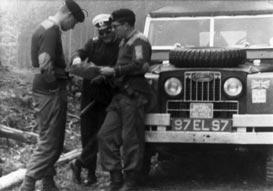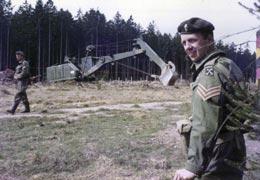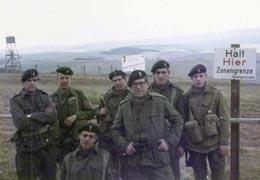
3 minute read
Screwjack Letter No 25
Tales from the Border
The MTO of the 9th/12th Lancers in Osnabruck had a 1962 Standard VW Beetle for sale, on which he had rebuilt the engine. It was an ex-Deutsche Bundespost (German staterun postal service) car with righthand drive. In 1962, this was tried as an experiment to allow the Postman to exit the car beside the pavement. It was the first of a total of eight old aircooled Beetles that I or Gill drove until 1999. I bought it for £76.
Advertisement
The border between the British / US zones of West Germany and East Germany (DDR) was heavily defended by the East German Grenztruppen (Border Guards), a force totalling nearly 50,000. This defence system was not designed to counter invasion from the West, but to prevent people from the East escaping to the West. Our border patrols therefore witnessed the astonishing sight of people building their own prison. Our British Army 5 Brigade section was along wide-open countryside. Our patrols lodged for two nights at a Gasthaus (German-style inn) in the small village of Immingerode, where the men put their camp beds in a large function room. I had the luxury of a bedroom.
Next morning, we met the British Frontier Force Officer, Lionel Corduroy, in Duderstadt town centre square. He was our guide. His BFF uniform was more Navy style than Army, and he was unarmed. We were fully armed. The purpose of our patrols, I think, was to demonstrate a continuous British Army presence and gather information about the East German frontier work. The Border Guards themselves, of course, were the people best placed to escape, and many did. One Guard said something rude to Lionel who recognised his Leipzig accent and he called out in German to the man’s officer “You should tell the Leipziger to watch his manners” Lionel had been in the job a long time. Another time he recognised a Guard he had seen before. He called out in German “Why so serious today?” The Guard replied “I forgot to clean my teeth this morning”. After heavy rain some of the anti-personnel mines in the ploughed strip were exposed and I was able to draw some for my report. The watch towers and barbed wire fences were already in evidence, but the main activity now was
to dig the anti-tank ditch. This was being done with drag-bucket machines that were in universal use until hydraulic diggers like JCBs were developed. In some places there were guard dogs on running wires. Occasionally the Eastern side sent small rockets showering propaganda leaflets over the frontier villages. A favourite leaflet was a banknote depicting cartoons of the West German leaders. On one of our patrols we were at the Gasthaus when the village men’s choir made their weekly visit. At the end they all sang “Deutschland Uber Alles”. To my surprise, my driver Craftsman Moxam, produced a hymn book and the patrol joined in, singing “Glorious Things of Thee are Spoken” to the same tune. During the drive back to Osnabruck I asked him about the hymn book. He said “I’m a sort of born-again Christian, sir”. I asked how this came about. He said “My last posting was in Munster. I had been out on the beer one night, and on the way back to the barracks I read a sign outside the Cathedral saying “God Wants You”. I said: “If you want me, you’ll have to come and get me”. Back at the barrack room we were just going to put the light out when three men came into the room. They were Army evangelists and one said “We’ve come to get you” Well, that was enough for me.” During another patrol, Lionel showed us where the frontier turned Eastwards around a farmhouse. He said that in 1945 a British Major and a Russian Major had the job of agreeing and marking the exact line of the border. The German farmer begged the British Major to keep his farmhouse in the West. After some negotiation the British officer handed the Russian a bottle of whisky and Meeting the British Frontier Force Officer, Lionel Corduroy (middle) the deal was done.

Drag-bucket machines were used to dig the anti-tank ditches Halt! Hier zonengrenze (‘Stop! Zonal border here’)











